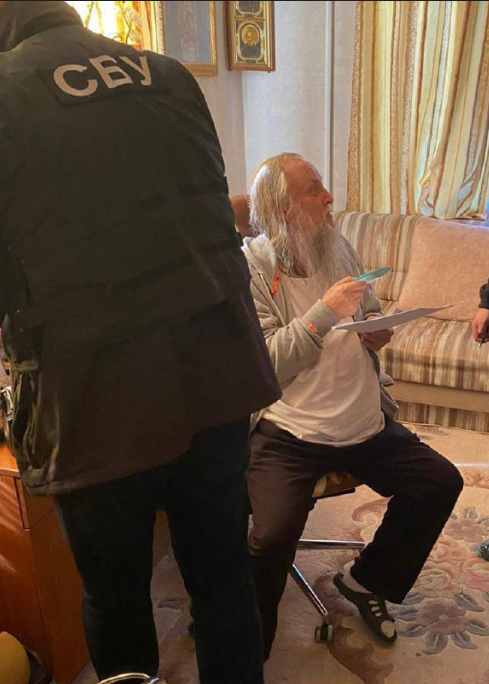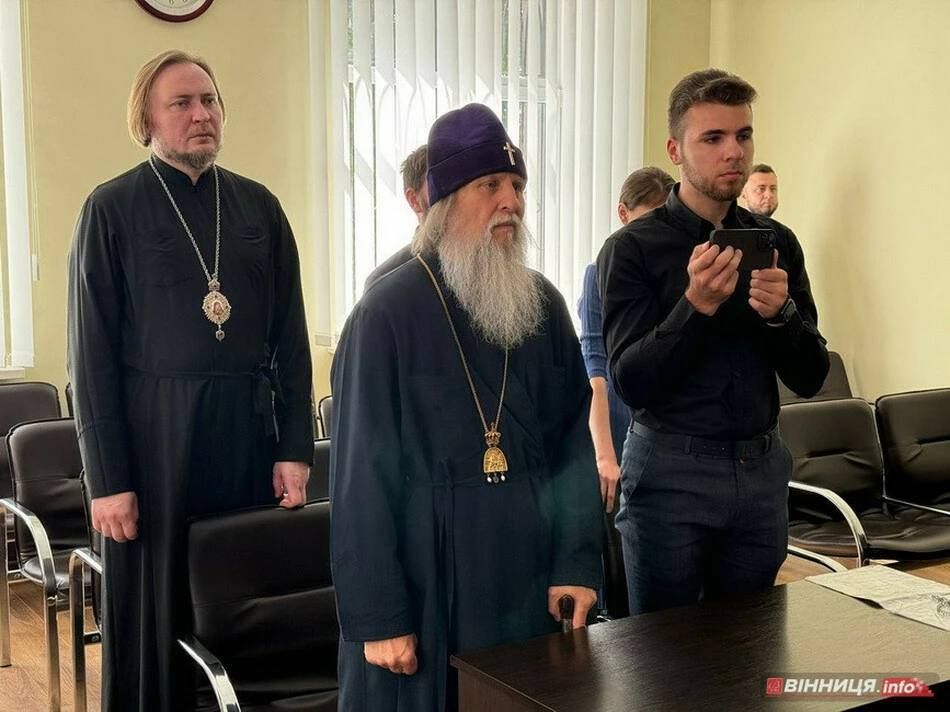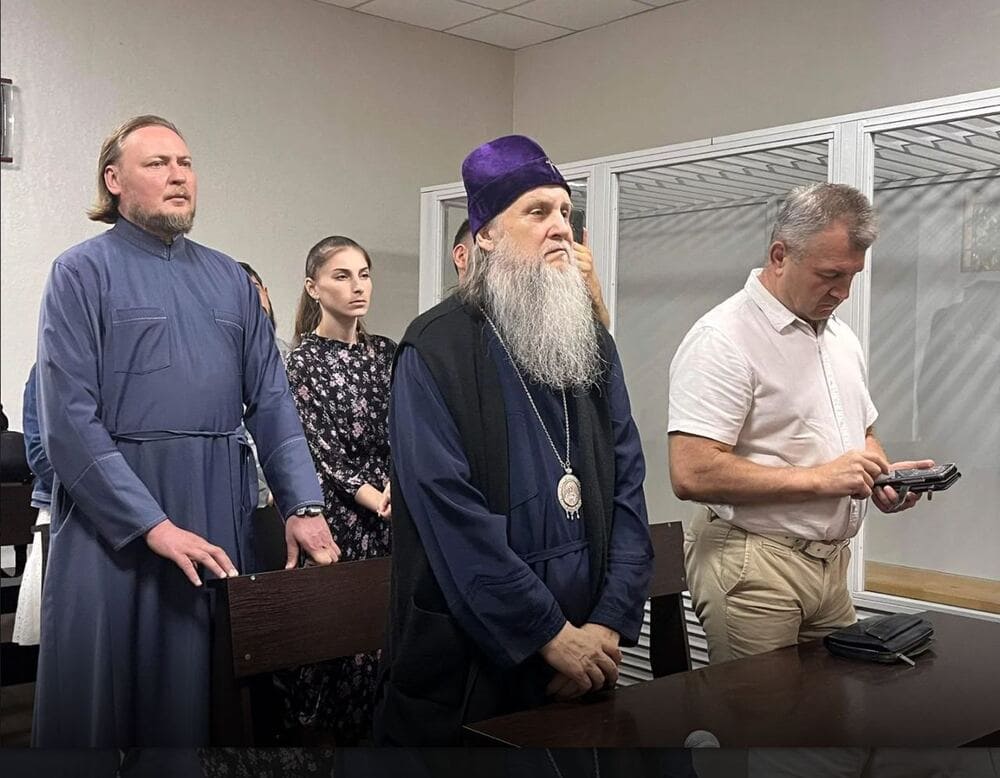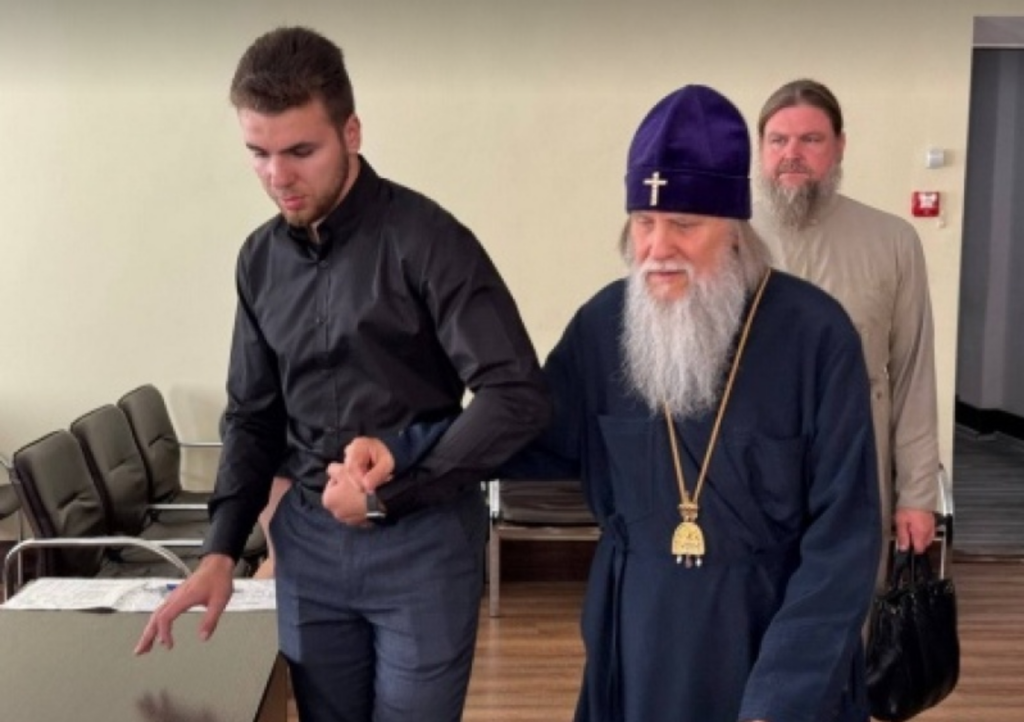On August 7, 2023, the Vinnytsia City Court sentenced 74-year-old Metropolitan Ionafan of Tulchyn and Bratslav (secular name: Anatoliy Ivanovych Yeletskykh) to 5 years imprisonment with property confiscation. This marks the first prison term ever imposed on a hierarch of the Ukrainian Orthodox Church (UOC).
The insulin-dependent metropolitan, who has undergone multiple surgeries, reportedly struggled to conduct services prior to his arrest due to severe diabetes. While the verdict acknowledged his health condition, it nonetheless mandated incarceration.
In October 2022, the Security Service of Ukraine (SBU) conducted searches at Metropolitan Ionafan’s residence as part of a criminal case opened under Article 161 of the Criminal Code of Ukraine (violation of the equality of citizens based on their race, nationality, religious beliefs, etc.).

The prosecution’s main evidence included an online article allegedly written by Ionafan, and leaflets found during the search. Some of the leaflet headlines were: “Donbas is Russia,” “The History of Crimea,” and “Appeal to the Russian Authorities.” According to the prosecutor, they contained phrases such as “Banderite authorities” and “brown plague.”
The article defending the UOC, titled “With an Open Helmet, Without a Visor: Notes on the Margins of Recent Events in the Orthodox World,” has since been removed from the Tulchyn diocese website. According to the SBU’s linguistic expertise, the article denies the autocephaly of the Orthodox Church of Ukraine (OCU), refers to its priests as “self-ordained schismatics,” and calls Ukraine the historical term “Malorossiya” (Little Russia) (in the context of 17th-century events). In a response to the pre-trial expert opinion on Metropolitan Ionafan’s article defending the UOC, the Scientific Secretary of the Kyiv Theological Academy, Archimandrite Mitrofan (Bozhko), noted the apologetic and polemical nature of Ionafan’s publication and emphasized that there is no reason to equate religious polemics with incitement to religious hatred.
The defendant’s lawyer, during closing arguments, noted that the metropolitan, while raising the question of the UOC’s canonicity in his article, touched upon the borders of the Kyiv Metropolis, which extended to Belarus and Little Russia; however, the prosecution criminalized the use of historical names.
The editor of the diocesan newspaper and administrator of the Tulchyn Eparchy’s official website, who was questioned in court and had published the Metropolitan’s article, testified that he considered the piece “an ordinary polemical article of interest to theologians and historians, but certainly not to ordinary citizens.”
“This is an intra-Church matter—you can’t imprison someone for it. This fact is understood not just by us, but even by the authorities. That’s why the Metropolitan wasn’t tried for his personal views on the UOC’s future path, but on entirely different charges, as absurd as they are fabricated,” writes the Union of Orthodox Journalists.

Regarding the leaflets, they were allegedly found behind work boots in the diocesan office. Witnesses questioned by the court did not see the moment of their discovery by investigators. One witness testified that had the leaflets been present before the search, his wife—who cleaned the premises—would have found and reported them, confirming these materials weren’t there prior to the raid.
However, the court chose to “critically assess” testimony from witnesses it deemed unreliable, stating they “canonically answered to the accused and thus couldn’t be considered objective.”
The prosecution claimed multiple copies of the leaflets were found, establishing the “publicity” required for some charges. The forensic report stated: “Provided materials, if existing in multiple copies or disseminated online, qualify as public.”
The Metropolitan was convicted under:
- Article 161-2 of Ukraine’s Criminal Code (violating equality based on nationality/religion/etc.) – 4 years (no professional restrictions)
- Article 436-2-3 (justifying Russian aggression) – 5 years + asset confiscation
- Article 109-2 (attempted constitutional overthrow) – 1 year + confiscation
- Article 110-1 (encroaching on territorial integrity) – 3 years + confiscation
The combined sentences resulted in a 5-year prison term with asset confiscation for the metropolitan.
A review of the verdict reveals that the first charge relies solely on the article defending the Church. The three other charges—for serious crimes—are based on leaflets allegedly discovered by SBU officers during the search, both in print and digital form. According to the prosecution, the metropolitan found these materials online, downloaded them, printed them, and intended to distribute them.
Defense attorney Ihor Chudovsky emphasizes that the accusations against Metropolitan Ionafan are contradicted by the computer forensic examination conducted by the SBU’s own experts. Their report documents that the three key files used as evidence under Articles 109, 110, and 436-2—the very charges underpinning the most serious allegations—were artificially created. Crucially, these files appeared after the computers were seized.
The search of Metropolitan Ionafan’s premises took place on October 11, 2022. Yet the forensic report states that the leaflets cited by the prosecutor—and later by the court—were added to the computer on October 15, four days after its seizure. In other words, the charges under Articles 109, 110, and 436-2 hinge on evidence that only appeared on the metropolitan’s computer while it was in law enforcement custody.

“The case also features two categories of bizarre evidence meticulously catalogued in the court’s verdict:
The first group comprises the Telegram cache, containing a wide variety of random material once downloaded to the phone, even through viewing a channel or receiving it from someone. Among the photo files in the Metropolitan’s Telegram cache, they found:
- “an image of a face resembling the President of Ukraine with the inscription: ‘Akhmat is power!’ [‘Akhmat is power!’ – reference to Chechen leader Ramzan Kadyrov’s forces]
- ‘an image of a cat against the background of the Russian flag, wearing a so-called ‘ushanka’ hat, with a pie in front of it inscribed ‘I love Russia’.” A file containing the well-known poem “I was treated by a Donetsk doctor” was also found on one of the devices. According to the investigation, this poem “glorifies representatives of the pseudo-formations of the Donetsk region.”
(Legal context: Ukrainian courts increasingly treat Telegram cache content as deliberate ‘possession’, despite its automated nature.)
Investigators claimed to find a file containing the poem “A Doctor from Donetsk Treated Me”*, which they allege “glorifies representatives of pseudo-entities in Donetsk Oblast”.
Note: The poem “Меня лечил донецкий врач” (“A Donetsk Doctor Treated Me”) is a deeply emotional and politically charged piece of Russian poetry that emerged during the early stages of the armed conflict in Eastern Ukraine. The poem is written from the perspective of a Ukrainian soldier who, after being wounded, is captured and treated by a doctor in Donetsk. The poem represents anti-war message, emphasizing the futility of conflict and shared suffering.
The second group of unusual evidence consists of publications about Ionafan after the searches and arrest, presented as proof of guilt. For example, a publication by Archimandrite Claudian, abbot of a men’s monastery in Tula, dated October 13, 2022:
“Dear brothers and sisters, I heartily congratulate you on the upcoming feast of the Protection of the Most Holy Theotokos, the patronal feast of the Russian land. I ask for your prayers for my spiritual father – Vladyka Ionafan (Eletskikh), it was he who ordained me to the diaconate and priesthood. He is a talented, even a genius person, ordained by the same famous Metropolitan Nikodim (Rotov) who ordained His Holiness Patriarch Kirill… He himself is from Voronezh, a true patriot of Russia, in his sermons he spoke much about the Russian world, about Russia. In these difficult times, he continued to commemorate His Holiness the Patriarch during the Divine Liturgy, for which he was reported to the SBU. On October 11, his apartment was searched, resulting in the discovery of his photographs with Patriarch Kirill, excerpts of the speech of the President of Russia, and the anthem of Donbas, which he composed… I ask for your prayers, let us ask the Queen of Heaven today that peace may soon come to the Ukrainian land!”
Why the court accepts materials written by third parties as evidence of guilt is unclear. According to the verdict, “Eletskikh’s guilt in committing the criminal offenses charged against him is fully proven by the materials of the criminal proceedings.” Furthermore, materials from the two unusual groups, including publications by third parties on Russian news resources (after the searches), which cannot be attributed to the actions and activities of the Metropolitan himself, were recognized by the court as “circumstantial evidence of the defendant’s attachment to the aggressor state of the Russian Federation, its head President Putin, and also to Patriarch Kirill of Moscow, the Primate of the Russian Orthodox Church.”

Following the verdict, both sides expressed a desire to continue the legal battle. As noted by Konstantin Gozdup, a representative of the Vinnytsia Regional Prosecutor’s Office, the prosecution will appeal the verdict and demand a longer prison sentence for the Metropolitan.
“We asked to sentence (Metropolitan Ionafan of Tulchyn) Eletskikh to six years, the court decided to give five. This year is important to us,” Gozdup emphasized.
“Metropolitan Ionafan of Tulchyn and Bratslav did not commit actions aimed at forcibly changing or overthrowing the constitutional order or seizing state power, or encroachment on the territorial integrity and inviolability of Ukraine, but he was convicted for these actions, which completely contradicts Article 13 of the Criminal Code,” the legal department of the UOC points out.
On June 22, 2024, as a result of negotiations between Ukraine and Russia on the exchange of detained persons, Metropolitan Ionafan was released from custody and sent to Russia. The Metropolitan refused the exchange, as he did not consider himself guilty, but his entourage advised him to accept this offer due to his age and poor health—he might not have survived five years in prison.
This translation was made using a neural network. If you find any inaccuracies, please contact us.


